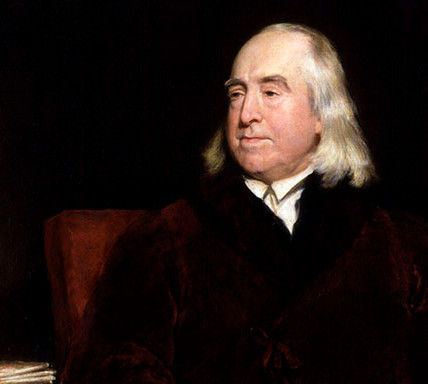A brief history of philosophy, part 10: Romanticism, utilitarianism and the dialectic

Jean-Jacques Rousseau
Jean-Jacques Rousseau (1712-1778), sometimes called the father of Romanticism, is often attributed with the phrase ‘noble savage’, although he never actually said it. What it implies is some golden age when humans lived in a ‘state of nature’ – in harmony with ecology and with each other.
Observations of the real world don’t bear that out however. Large-scale extinctions have followed humans around the globe – in Australia around 46,000 years ago, for example, when the giant marsupials were all wiped out, including giant kangaroos, tapirs, wombats and marsupial lions; and in North America around 11,000 years ago, when the first native Americans removed all the mammoths, sabre-tooth cats and giant ground sloths from that continent, along with many others. Modern, non-industrial tribes certainly don’t live in harmony with each other, and a little bit further down the evolutionary ladder, fellow primates chimpanzees are known to sometimes attack neighbouring troops and tear to pieces the weak and the slow. Nature is what keeps us alive, but it isn’t kind, and science didn’t suddenly make us savage – humans were perfectly capable of killing each other and destroying nature without it. Technology does allow us to do it on a much bigger scale though.
However, the picture is different if we look at relations within hunter-gatherer bands rather than between them. Murray Bookchin, in the Ecology of Freedom, and Marshall Sahlins in Stone Age Economics show evidence of a hunter-gatherer past with a) no wealth hierarchy – no-one had a bigger hut or more possessions than anyone else, and in fact as nomads, no-one had more possessions than they could carry; b) no power hierarchy – the best hunters were recognised as such, and allowed to make decisions about hunting, and so on. People’s knowledge was recognised and their authority respected for the good of the group, but there were no ruling bloodlines or seizing of power; and c) plenty of free time – the essentials of life could be collected in just a few hours each day, leaving plenty of time for sleeping, socialising, dancing, eating and crafts. I can perhaps see a glint of a golden age there.

The principles of utilitarianism, developed by Jeremy Bentham (1748-1832) were more-or-less the opposite of Kant’s ethics, which were categorical – a lie is always wrong for example, and that includes lying to a big, angry-looking man with an axe who asks where your children are. This is called Kant’s ‘categorical imperative’. I assumed that in this case, Kant would make allowances – after all, it’s less morally wrong to lie than it is to be an accessory to a murder. But no – apparently when Kant was asked, he said that it was morally wrong to lie to the axe-murderer.
I’m with Bentham on this one – the principles of utilitarianism are that we should follow a course of action that maximises benefit or utility in society – in other words that brings about the greatest happiness for the greatest number of people. However, there appears to be a problem with this approach too, as maximum utility might be achieved by the oppression of a minority. Ethics are perhaps a bit too slippery for all situations to be covered by one theory. Maybe we just need to talk things through.
Georg Wilhelm Friedrich Hegel (1770-1831), love him or hate him, was the superstar of 19th century philosophy. He found Kant’s separation of phenomenal and noumenal unacceptable. The human mind is not separate from the rest of the universe – it’s an integral part of it. We are becoming aware of the universe we live in, and so the human mind is not just for interpreting the universe – in a very literal sense, it’s there to help the universe become aware of itself, and to shape its (and therefore our own) future.
Let’s say it another way – the human mind is (at least in this neck of the woods) the only part of the universe that is able to understand the universe, and is therefore how the universe is able to understand itself. The universe is evolving, along with the human mind. Similar things may be happening in other parts of the universe too of course – we just don’t know yet.

So for Hegel, in opposition to Kant, the human mind was not restricted to the phenomenal – it was the vanguard of the universal spirit, unfolding. The world spirit becomes aware of itself in the individual, then develops via other people, civil society, politics, and then further into art, religion and finally philosophy, which holds up a mirror to the world spirit. In his observations of everyday human interactions, he could see that people didn’t think of the ‘universal mind’ or the unity of humanity – they just saw competition, which ended in one party becoming ‘master’ and one ‘slave’ (either via real slavery, feudalism, or private employment); this was unstable, because the slave is constantly trying to escape from slavery.
Hegel envisioned history as a flow, with direction, and he developed the ‘dialectical method’ to explain it. This involved a ‘thesis’ (a position), an ‘antithesis’ (an opposing position), from which a ‘synthesis’ is formed via the battles between the two initial positions. This synthesis then forms the next thesis, to which an opposing antithesis appears, and a new synthesis is formed – and so on. We’ve already seen how the positions of Parmenides, Heraclitus and Empedocles on change and permanence could be interpreted as an example of this. So the universal spirit moves society forward through history, and the dialectic is the mechanism. The thrust of Hegel’s ‘dialectical idealism’ was that developments in human thinking change social and economic conditions, the ultimate goal of which is the liberation of ‘Mind’.






